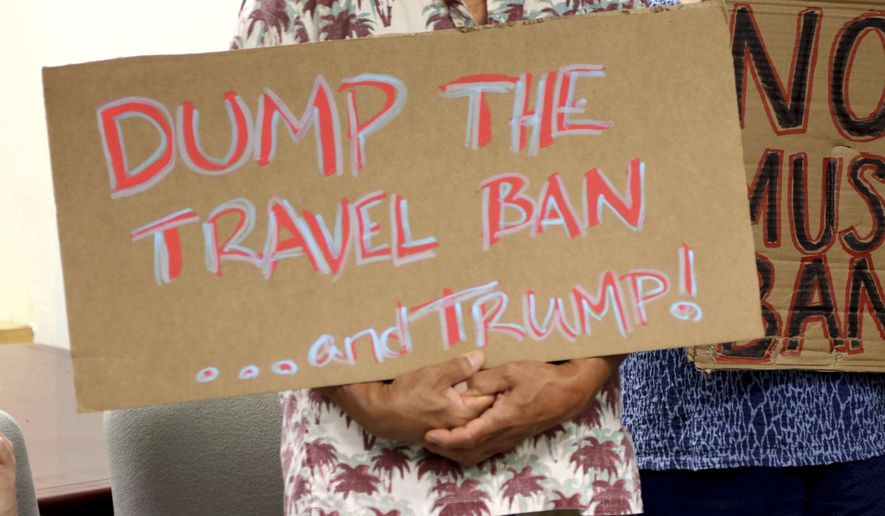A federal judge delivered President Trump yet another legal victory on his travel ban executive order late Thursday, allowing to remain in effect the White House’s revised rules that cast a fairly narrow screen on who will be admitted as refugees or from six targeted countries.
Judge Derrick K. Watson said the state of Hawaii and other immigrant rights groups challenging Mr. Trump should take their beef up with the Supreme Court since it was the justices’ vague ruling that has led to confusion.
“This court will not upset the Supreme Court’s careful balancing,” Judge Watson wrote.
In a June 26 ruling, the justices agreed to let much of Mr. Trump’s extreme vetting policy go into effect, canceling an earlier injunction Judge Watson and other federal judges had imposed.
The justices, in a 9-0 ruling, said that for would-be visitors without a connection to the U.S. — either a close relative or a job offer or participation in a school program, for example — Mr. Trump could exclude them. For those with close relationships, however, the justices said the relatives or entities in the U.S. had rights that must be weighed, and for now those rights trump the president’s security concerns.
The Supreme Court has planned full arguments for October.
But the justices didn’t define what a close relationship means, leaving it up to the administration to say, and Mr. Trump’s opponents to then battle over.
Homeland Security said it looked to federal immigration law and previous court rulings and concluded that parents, siblings and spouses were close relationships, but others — including grandparents, cousins, aunts and uncles and even couples engaged to be married — did not qualify.
Hawaii Attorney General Douglas S. Chin had argued that in his state, close family relationships had a much broader meaning that needed to be protected.
Judge Watson said he’d be happy to interpret his own orders, but since the standard in this case was set by the Supreme Court, it’s up to the justices to say what they meant.
Justice Clarence Thomas had predicted a slew of lawsuits would result from the high court’s ruling last month, saying they had left a muddle.
For now, Mr. Trump remains free to restrict entry of many would-be visitors from Iran, Libya, Somalia, Sudan, Syria and Yemen — the majority-Muslim nations that the government, dating back to the Obama administration, has deemed to be threats. His executive order imposes a 90-day pause on those admissions.
Mr. Trump has also called for a 120-day halt to refugee admissions worldwide. The Supreme Court said he could only halt those refugees who, like the visitors from the six targeted countries, don’t have a close relationship with someone in the U.S.
All sides are still trying to hash out what that means, and whether refugees in the pipeline who have been promised resettlement by a nonprofit agency in the U.S. can still come.
For now, Judge Watson’s ruling marks another rare court victory for Mr. Trump after a string of defeats.
His original travel ban policy issued in January was blocked by several courts, including the 9th U.S. Circuit Court of Appeals. He went back to the drawing board and revised his order in March to meet the 9th Circuit’s objections, but that court and the 4th Circuit blocked even the updated order, arguing Mr. Trump broke procedural laws and, in the case of one of the courts, said he showed too much animus toward Muslims to allow his order to stand.
The Supreme Court, though, rejected those reasons, instead looking at the executive order on its face and concluding Mr. Trump did have national security and immigration powers as president that must be respected.
• Stephen Dinan can be reached at sdinan@washingtontimes.com.




Please read our comment policy before commenting.